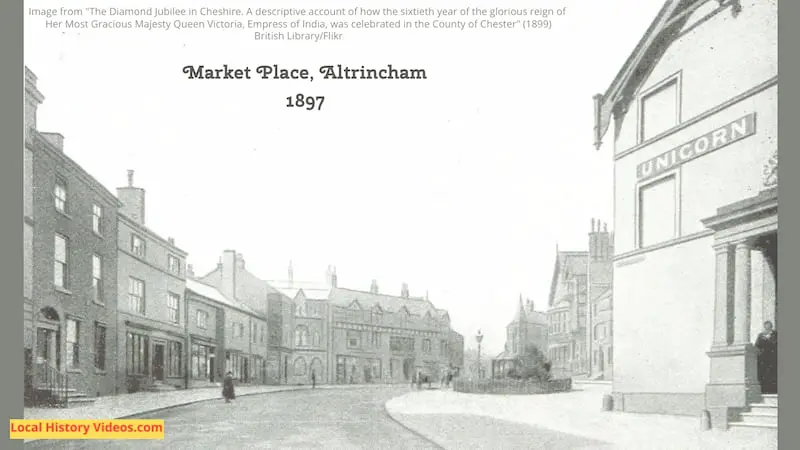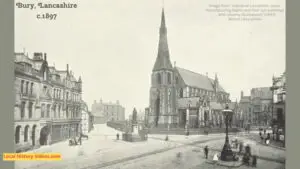Glimpse history through old images of Altrincham, England, a market town traditionally in Cheshire but since 1974 part of Greater Manchester, UK.
1936
In 1936, hundreds of children marched out in formation for a mass physical exercise demonstration, watched by proud parents. There are occasional glimpses of the background.
YouTube: Physical Training (1936) – British Pathé
Korean War Hero 1952
On 4th February 1952, Private William Speakman of the Black Watch – King’s Own Scottish Borderers flew from Korea into R.A.F. Lyneham, Wiltshire, on his way home from service in the Korean War. There he was met by the Mayor of Altrincham, himself a war hero, who would accompany him back to their home town.
Private Speakman had won the Victoria Cross for his actions at Hill 217, and would soon be receiving his honour from King George VI. But the death of the monarch meant this soldier, born to an unmarried domestic worker, became the first person to receive the VC from Queen Elizabeth II.
When his battalion came under fire on 4 th November 1951 from 6,000 Chinese troops, Private Speakman filled his pouches and all available pockets with hand grenades. Then he rose to his feet and pelted the attackers with grenade after grenade, pausing only to return to refill his pockets, even after he had been shot in the shoulder and leg and ordered to seek medical help.
Six men in the battalion joined him in an attempt to clear the ridge, even resorting to throwing stones and ration tins as the combat went on. A final charge cleared the ridge of enemy soldiers, and the remnants of the company were able to withdraw.
He quickly returned to fighting for the services, including the SAS, married three times, had six children with his first wife, and met Nelson Mandela late in his career when working in South Africa.
At some point in his lifetime, Bill Speakman sold his VC medal to pay for a new roof.
William Speakman died on 20th June 2018 at the age of 90, surrounded by loved ones at the Royal Hospital Chelsea, where he had lived as an in-pensioner since 2013. His ashes were buried in the United Nations Memorial Cemetery of South Korea.
In this newsreel, William Speakman towers above all the men around him, and at the end we see him having to stoop to get through his mum’s doorway.
All the ladies worked hard to make their front doors and doorsteps clean, and the children were given the day off from school. Thousands of people came to greet him home.
Speakman V.C. Comes Home (1952) – British Pathé on YouTube
1980s Drive
A short vintage film clip of a 1980s drive shows the Barclay’s Bank, before the car starts moving and we see shops and houses down the road.
YouTube: Driving through Altrincham, 1980’s. Archive film 93666 – HuntleyFilmArchives
Altrincham Interchange
This video, just over 4 minutes long, showcases many fascinating old photos of the interchange and the key moments from the transport system’s history.
Altrincham Interchange – A Brief History 1849 to 2014 – Transport for Greater Manchester on YouTube
Photos from 2013
Neil Taylor’s photographs from 2013 are so extensive they’ve formed enough material for a half hour video!
YouTube: Altrincham A Snapshot 2013 – Neil Taylor
Historic Book
Extract from “A History of Altrincham and Bowdon With an Account of the Barony and House of Dunham” by Alfred Ingham
Published in 1879
Pages 168-171
The Altrincham Union for Poor Law purposes was formed in 1835. For a long time prior to this attempts had been made to deal with the constantly increasing pauperism of the country . The system of out-door relief had led to oppressive poor rates .
For Altrincham the workhouse was situated at Broadheath , having been built in 1756. This was carried on for a great number of years under the direction of trustees , although the inhabitants in public meeting appeared to influence their course of procedure to a great extent .
At times there were sinister rumours as to its management , and on one occasion several gentlemen were appointed to make an investigation . They reported ” that the woman who acts as governess says she is well acquainted with every article received into the house . She says all in the house have great plenty of what is good and useful , they have butchers ‘ meat three times a week ; that which was in the house was very good , and so also was the butter . The bread is very good , and the gentlemen so appointed are fully satisfied that the provisions are good and sufficient . “
In 1822 a Select Vestry was formed in Altrincham , and the administration of the Poor Law progressed another stage . In their first report the members express considerable satisfaction , that they have reduced the amount paid in relief . They indulge in a hope that a still further reduction will be made , and that the sentiments of honest independence by whichthe poor of this country were once characterized will gradually revive amongst them ; and that their own exertions , aided by the occasional advice and assistance of their richer neighbours ” ( a nice way of putting a pauperizing principle ) ” will always remain their surest support in the hour of distress and sickness . “
This pleasant piece of moonshine is concluded by an appeal to the members of the Select Vestry to attend in large numbers for the future .
In the course of the following year the business of manufacturing was commenced at the workhouse at Broadheath , when five looms were started , and the net earnings which accrued in this way and the labour of one of the inmates reached the sum of £ 20 15s . in about five months . ” In a word , ” continues the report ( this was the second issued ) , ” the workhouse promises under good management to be a source of profit to the township ; and as none of the inmates who are capable of work are suffered to be idle , but , on the contrary , are encouraged to be industrious , the hope may be entertained , that should the number of them increase the advantage will be augmented in the same proportion . “
The accounts for this period, therefore , show an indiscriminate mixture of warps and weft, of healds , and shafts and shuttles , with buttermilk , salt , smocks and frocks , and crockery ; but in spite of these glowing accounts , there was , not many years afterwards , a rate of three shillings in the pound laid for Poor Law purposes , the assessment of the town at this time being £ 3,500 .
Probably the expenditure was greatly reduced in subsequent years ; for in an abstract of the receipts and payments concerning the workhouse of the township of Altrincham , in 1831 , the expenditure for 30 weeks is given at £ 52 1s . 4d . Another entry shows the average number of inmates to have been 14 1-15, the cost of victualling per week Is . 6 d., clothing 1s . 8jd .; and these with other incidental expenses , made a total of 3s . 5 d . per head per week . For this amount , as we have already seen , the paupers were allowed the luxury of ” flesh mate , ” as butcher’s meat is spelled in the accounts , three times a week .
Speaking of ” flesh mate ” reminds us that on one occasion the visitors appointed by the Vestry were directed to purchase a piece of beef , not exceeding 12 pounds , to be sent down to the workhouse for a feast on New Year’s day, “and that a glass of ale be allowed to such of the inmates as the governor may think fit to allow such an indulgence . “
For some time , however , matters did not work smoothly in local bumbledom . The governor , notwithstanding his numerous privileges and handsome salary ( £ 10 a year ) was a man of hasty temper , as governors of the old stamp are said by tradition to have been .
At one of the meetings of the select vestry , Mr. John Lupton informed his fellow members that he had been grossly insulted by the governor , who had threatened to strike him ! Such conduct could not of course be permitted . He was ordered to appear before them , and produced Mr. John Warren , who , he said , was fully acquainted with the circumstances . Mr. Warren , how ever , knew nothing of the matter , beyond that the governor was in a state of ” extreme intoxication ” at the time . The tables being thus unexpectedly turned , the governor admitted what was said to be correct , and added that he did not know how the thing began or ended , ” and having apologized his offence was overlooked .
But this governor was soon in greater difficulties than ever . At a meeting held on the 21st May , 1828 , the overseer of the poor intimated that the governess of the workhouse had fled , ” taking her clothes with her , that her husband does not know where she is gone , or whether she means to return . ” The vestry was very accommodating . The overseer was directed to keep an eye to the workhouse , ” the governor in the meantime to go in search of his runaway spouse , -if he should so feel inclined”. Whether he departed on this mission or not does not appear ; but a week afterwards it is reported that the governess has not yet returned , ” nor is there any probability she will return . ” This was more than the vestry could submit to .
The governor was instantly discharged , and when appointing a successor great cautiousness was evinced , inasmuch as it was stipulated that if the new governor and governess did not come up to expectation , they would be expected to quit the house and give up the situation in a month . They gave satisfaction ; for soon afterwards it was ” Resolv’d that this meeting is of opinion that the governor of the workhouse be allowed to occupy and use one of the looms in the weaving shop for the purpose of weaving in himself , and that he be allow’d to take to his own the earnings therefrom , he having requested that such liberty should be allow’d to him.” This governor was Mr. George Dean, for many years a postman , and is still living .
More about Greater Manchester
- Old Images of Greater Manchester, England
- Old Images of Tyldesley, England
- Old Images of Heywood (Lancashire, now Greater Manchester)
- Old Images of Chadderton, England
- Old Images of Ashton-in-Makerfield, England
More Greater Manchester local history resources
Back to Home Page



